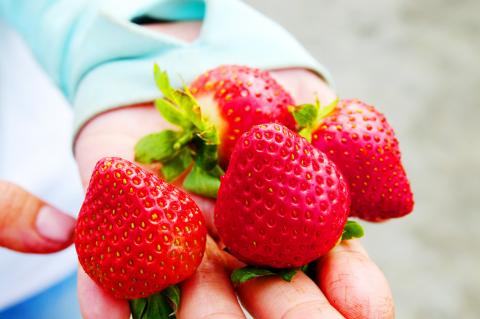Most of the food products sold at convenience stores that claim to contain fresh strawberries instead contain food additives and not the actual fruit, an investigative report by the Chinese-language Liberty Times (sister newspaper of the Taipei Times) has found.
Capitalizing on the strawberry season, which lasts from December to April, many convenience stores and food producers have launched products that purportedly contain fresh strawberries.
Of the nation’s four major convenience store chain operators, President Chain Store Corp’s (統一超商) 7-Eleven and Taiwan FamilyMart Co (全家便利商店) each sell about 40 products claiming to contain strawberries.

Photo: Liu Hsiao-hsin, Taipei Times
However, none of the products sold at 7-Eleven stores and only two at Taiwan FamilyMart stores actually contained strawberries, while of the 18 strawberry food products sold at Pxmart (全聯實業), only half contained the fruit, the report found.
The products’ ingredients include food additives such as spices, food coloring, thickeners and sweeteners, in addition to other common ingredients, while ingredients related to strawberries are actually derivatives of the fruit, such as syrup, jam or powdered strawberries, it said.
7-Eleven on Friday said that its strawberry products clearly list their ingredients on their labels, adding that none of them contravene the regulations.
Taiwan FamilyMart said that it is normal practice to promote products that are in season and consumers are free to purchase products according to their needs.
Pxmart said that all of its strawberry products contain strawberries, adding that while the fruit might be processed into different forms, its strawberry products are all authentic.
The Executive Yuan’s Department of Consumer Protection Officer Wang Te-ming (王德明) said that labels should be clear, as consumers have the right to know what the products contain.
Consumer Protection Foundation chairman Yu Kai-hsiung (游開雄) said products promoting seasonal fruits should include the fruit, adding that the foundation has long criticized a discrepancy between product names and their contents.
Food additives do not have a serious effect on health, doctors said, but drew attention to the overconsumption of sugar, fats and starch.
The nation’s food labeling regulations are strict, said Chiang Chih-kang (姜至剛), a doctor at National Taiwan University Hospital, adding that as long as the food industry follows the regulations, the public need not worry about acute poisoning or bodily harm.
The consumption of sugar is the main issue, Taiwan Adventist Hospital nutritionist Liu Yi-li (劉怡里) said, as its overconsumption could lead to obesity, a high percentage of body fat, high levels of triglyceride or metabolic syndromes.
Children are likely consume more processed food than vegetables and fruits, National Taiwan University’s Institute of Food Science and Technology professor Sheen Lee-yan (沈立言) said, adding that parents should feed their children more fruits and teach them the difference between natural and processed food.

Tropical Storm Gaemi strengthened into a typhoon at 2pm yesterday, and could make landfall in Yilan County tomorrow, the Central Weather Administration (CWA) said yesterday. The agency was scheduled to issue a sea warning at 11:30pm yesterday, and could issue a land warning later today. Gaemi was moving north-northwest at 4kph, carrying maximum sustained winds near its center of up to 118.8kph and gusts of 154.8kph. The circumference is forecast to reach eastern Taiwan tomorrow morning, with the center making landfall in Yilan County later that night before departing from the north coast, CWA weather forecaster Kuan Shin-ping (官欣平) said yesterday. Uncertainty remains and

SEA WARNING LIKELY: The storm, named Gaemi, could become a moderate typhoon on Wednesday or Thursday, with the Taipei City Government preparing for flooding A tropical depression east of the Philippines developed into a tropical storm named Gaemi at 2pm yesterday, and was moving toward eastern Taiwan, the Central Weather Administration (CWA) said. Gaemi could begin to affect Taiwan proper on Tuesday, lasting until Friday, and could develop into a moderate typhoon on Wednesday or Thursday, it said. A sea warning for Gaemi could be issued as early as Tuesday morning, it added. Gaemi, the third tropical storm in the Pacific Ocean this typhoon season, is projected to begin moving northwest today, and be closest to Taiwan on Wednesday or Thursday, the agency said. Today, there would likely

DISRUPTIONS: The high-speed rail is to operate as normal, while several airlines either canceled flights or announced early departures or late arrivals Schools and offices in 15 cities and counties are to be closed today due to Typhoon Gaemi, local governments announced last night. The 15 are: Taipei, New Taipei City, Taoyuan, Tainan, Keelung, Hsinchu and Kaohsiung, as well as Yilan, Hualien, Hsinchu, Miaoli, Chiayi, Pingtung, Penghu and Lienchiang counties. People should brace for torrential rainfall brought by the storm, with its center forecast to make landfall on the east coast between tonight and tomorrow morning, the Central Weather Administration (CWA) said. The agency issued a sea warning for the typhoon at 11:30pm on Monday, followed by a land warning at 11:30am yesterday. As of

CASUALTY: A 70-year-old woman was killed by a falling tree in Kaohsiung as the premier warned all government agencies to remain on high alert for the next 24 hours Schools and offices nationwide are to be closed for a second day today as Typhoon Gaemi crosses over the nation, bringing torrential rain and whipping winds. Gaemi was forecast to make landfall late last night. From Tuesday night, its outer band brought substantial rainfall and strong winds to the nation. As of 6:15pm last night, the typhoon’s center was 20km southeast of Hualien County, Central Weather Administration (CWA) data showed. It was moving at 19kph and had a radius of 250km. As of 3pm yesterday, one woman had died, while 58 people were injured, the Central Emergency Operation Center said. The 70-year-old